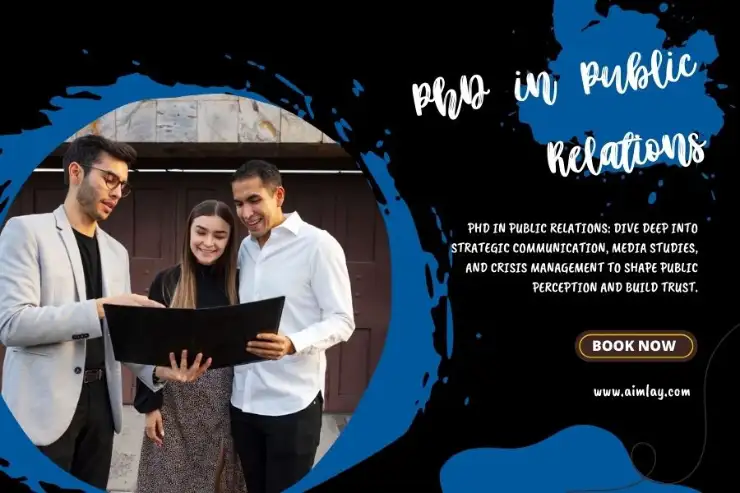Public Relations (PR) is a strategic communication process that creates mutually beneficial relationships between organizations and their higher authorities. It plays a crucial role in shaping public perception, managing reputation, and influencing individuals towards trends. As the world is evolving rapidly and becoming more interconnected and joint, the demand for skilled Public Relation professionals continues to develop and evolve. A PhD in Public Relations course provides an unique blend of opportunities to delve deep into various theories, practices, and complexities of this advanced field. It is designed for individuals who are looking forward to enhance their knowledge in PR, conducting original and absolute research, and contributing to the academic and professional course
Let’s explore the various aspects of pursuing a PhD in Public Relations, including the admission process, important dates, eligibility criteria, entrance exams, selection criteria, top colleges, syllabus, tips, and tricks for the course, as well as some frequently asked questions relating to PhD in Public Relations.
PhD in Public Relations: Highlights Of Course
Check the table below for the appropriate course highlights
Course Duration | 3-6 Years |
Eligibility criteria | At least 55% marks in graduation or post-graduation. |
Admission Process | Entrance Exams/ Direct Admission |
Entrance Exam | CSIR UGC NET, UGC NET, IIT JAM, NPAT and Gate
|
PhD Specializations |
|
Career Prospects |
|
Top Colleges |
|
PhD in Public Relations: Admission Process
PhD Admission 2025 for PhD in Public Relations typically involves the following steps:
- Research: Start by researching for various universities and programs that offer a PhD in Public Relations. Also seek for programs that align in relation to your research objectives and PhD Career scope.
- Meet Eligibility Criteria: Ensure you meet the specific eligibility criteria set by the university or research institute, which may include an undergraduate or master’s degree in a respective field, relevant work experience, and proficiency in English language.
- Submit Application documents: Prepare your application materials, which may include personal documents, letters of recommendation, a statement of purpose, and a research proposal outlining your chosen research topic.
- Entrance Exam: Some universities may require you to take an entrance exam, such as VITMEE or an equivalent test to qualify but not all universities require these entrance exams.
- Interview: Shortlisted aspirants may be called for an interview to assess their suitability for the program.
- Admission Decision: After completing the above required steps, you will receive an admission letter from the university or research institute for successful admission.
PhD in Public Relations: Important Dates
Exam Name | Application Period | Exam Date(s) | Relevant Fields | Official Website |
GATE 2025 (Graduate Aptitude Test in Engineering) | August 28, 2024 – September 26, 2024 | February 1-2, 2025 and February 15-16, 2025 | Engineering, Technology, Architecture, and Science | gate2025.iitr.ac.in |
UGC NET 2025 (University Grants Commission National Eligibility Test) | To Be Announced | January 1-19, 2025 | Humanities and Social Sciences | ugcnet.nta.nic.in |
CSIR NET 2025 (Council of Scientific and Industrial Research National Eligibility Test) | To Be Announced | February 16-28, 2025 | Science and Technology | csirnet.nta.nic.in |
JEST 2025 (Joint Entrance Screening Test) | To Be Announced | March 2025 (Tentative) | Physics and Theoretical Computer Science | |
GPAT 2025 (Graduate Pharmacy Aptitude Test) | To Be Announced | June 2025 (Tentative) | Pharmacy | gpat.nta.nic.in |
AILET 2025 (All India Law Entrance Test) | To Be Announced | December 8, 2024 | Law | |
IGNOU PhD Entrance Exam 2025 | To Be Announced | February 2025 (Tentative) | Various Disciplines | |
VITREE 2025 (VIT Research Entrance Examination) | To Be Announced | To Be Announced | Various Disciplines |
Application Form 2025 and How to Apply?
The application form is available online through various portals of the official website of the required university or research institute.
To apply, follow these specific step for PhD admission :
Visit the official website of the university or research institute offering the PhD program in Public Relations.
Go to the Phd admission 2025 section and find the PhD program in Public Relations.
Fill out the online application form with accurate and detailed information.
Upload the required documents, personal documents like identity proof, letters of recommendation, statement of purpose, and research proposal.
Pay the application fee as prescribed by the university or research institute.
Submit the application before the deadline.
PhD in Public Relations: Eligibility criteria
The eligibility criteria for PhD in Public Relation includes:
- Under graduation or master’s degree in a particular subject from a recognized university.
- Minimum qualifying marks are 55% and above in the qualifying examination.
- Relaxation of 5% in minimum qualifying marks for SC/ST/OBC/PWD candidates as per government norms.
- Qualifying in the university’s entrance exam or national-level exams like UGC-NET, CSIR-NET, or GATE (if applicable).
PhD in Public Relations: Entrance Exam 2025
While some of the universities or research institutes choose to have their own entrance exams, others may require test scores from common national-level exams like UGC-NET, CSIR-NET, or GATE into consideration. The entrance exam is taken to access the student’s subject knowledge expertise, research aptitude, critical thinking, and critical writing skills. The Phd Entrance Exam Syllabus includes several multiple-choice questions (MCQs) or descriptive questions on topics in relation to the candidate’s chosen field of study. The entrance test includes patterns and PhD syllabus according to the subject and specific guidelines given by the university, but it is usually divided into several different sections including research methodology, subject-specific knowledge, and general aptitude.
PhD in Public Relations: Selection Criteria
Selection criteria for PhD Degrees may vary from university to university, research institute, and subjects chosen for the course. Some common selection criteria include:
- Academic Record: Most of the universities and research institutes need a strong academic background with highly qualified educational skills in Undergraduate or master’s degrees.
- Research Proposal: Aspirants are generally required to submit a detailed research proposal describing the various key areas of the proposed research topic, literature, methodology etc. The topic of the research proposal should be a very unique in relevance to the field of study. This is taken into consideration to analyze the originality of the proposed research.
- Letter of Recommendation: Letters of recommendation from mentors and experts working with the aspirant’s academic research abilities are required and must be attached to the applicant’s form for getting an advanced PhD degree in Public Relation
- Statement of Purpose (SOP): Statement of Purpose is required for stating the applicant’s studies, research interests for the PhD degree.
- Entrance Tests: Some universities or research institutes may also require students to qualify a national standardized common test like CSIR UGC NET, UGC NET, IIT JAM, NPAT, and Gate. While some universities and research institutes take their own entrance exams.
- Interviews: In mostly all the cases, aspirants may need to attend in-person or virtual interviews to discuss research interests and goals.
- Work experience: Some specific work experience, mainly in a research or academic area, may be a necessary requirement of some universities but mostly not all.
- Publications and presentations: Aspirants who have presented research papers at conferences or who have published research papers may receive an edge over other aspirants.
PhD in Public Relations: Top Colleges
Best top colleges to undertake PhD in Public Relation are:
- Capital University,
- Mangalayatan University,
- UPES University,
- Benett University
- Asian academy of film and television
- Amity University
- New Delhi institute of Event Management
PhD in Public Relations: Syllabus
A PhD syllabus of Public Relations typically covers advanced topics like:
- Advanced Communication Theory: In-depth study of communication models, including socio-psychological, cybernetic, and cultural approaches. Examination of theories relevant to public relations practice.
- Research Methods in Communication: Advanced research methodologies like quantitative, qualitative, and mixed methods approaches. Focus on designing and conducting research relevant to public relations contexts.
- Strategic Public Relations: Exploration of strategic planning, campaign development, and evaluation techniques in public relations.
- Media Relations: Study of media systems, journalistic practices, and the role of media in shaping public opinion. Techniques for building and maintaining relationships with media professionals.
- Corporate Communication: Examination of communication strategies used by organizations to manage their reputation, build relationships with stakeholders, and communicate effectively internally and externally.
- Digital Media and Public Relations: Exploration of digital communication technologies and their impact on public relations practice. Study of social media strategies, online reputation management, and digital storytelling.
- Global Public Relations: Examination of cross-cultural communication theories and practices in a globalized world. Strategies for conducting public relations campaigns across different cultural contexts.
- Ethics in Public Relations: Discussion of ethical issues in public relations practice, including transparency, honesty, and the responsible use of communication tactics.
Final Thoughts
A PhD in Public Relations can open up a world of new opportunities for those interested in pursuing a career in various sectors . Throughout the course of your PhD program, you will delve deep into the theories, practices, and strategies of public relations, gaining a comprehensive understanding of this dynamic field of Public relation. You will have the opportunity to conduct original research that contributes to the body of knowledge in public relations and prepares you for a successful career in academia, research institutions, or the industry. It’s a challenging but rewarding journey that can lead to exciting career prospects and the opportunity to make a meaningful impact in the field of PR.
Frequently Asked Questions
Graduates of a PhD program in Public Relations can pursue careers in academia, research institutions, corporate communications, public affairs, and more.
While both programs focus on communication, a PhD in Public Relations typically delves deeper into the theories and practices of PR, while a PhD in Mass Communication may have a broader focus on media and communication studies.
While prior work experience in Public Relations is not always required, it can strengthen your application and provide valuable insights that enhance your research.
Yes, many universities offer online PhD programs in Public Relations for students who prefer the flexibility of distance learning.
PhD in Public Relations can benefit your career in academia by providing you with the necessary qualifications and expertise to teach at the university level, conduct research, and publish scholarly work.






